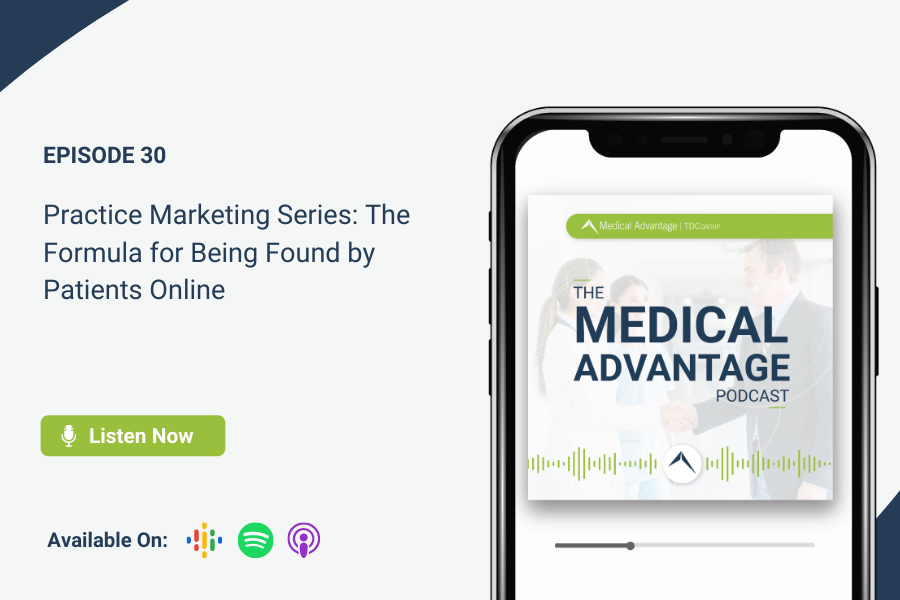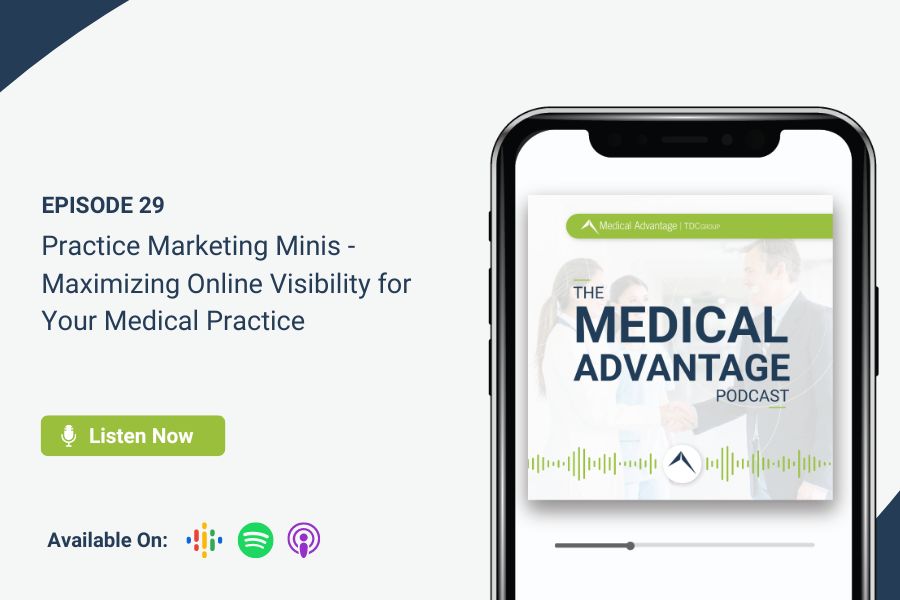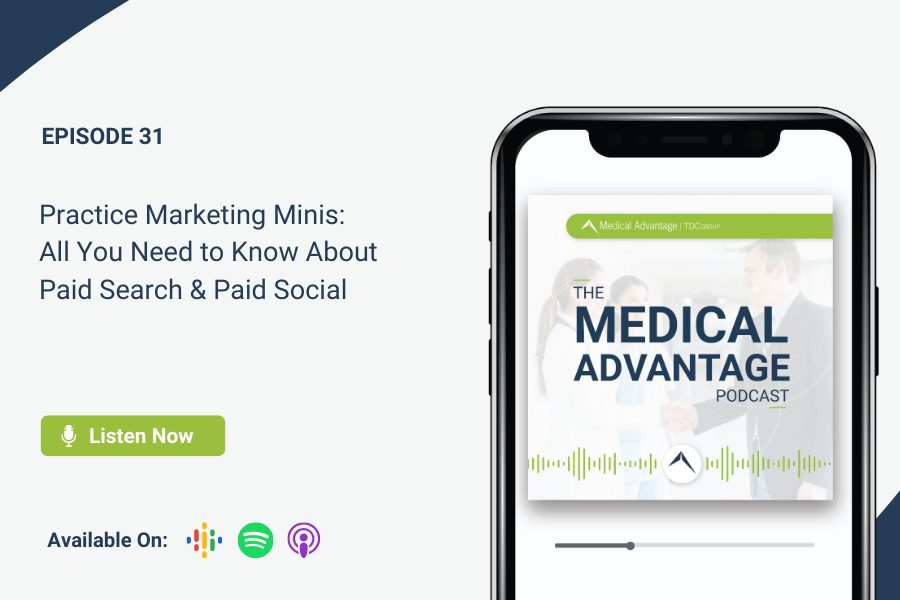Ep. 30 Practice Marketing Series: The Formula for Being Found by Patients Online
That most people first approach healthcare with an online search is a symptom that the patient journey has become a digital one. A study from eligibility.com reports that 89% of Americans ask Google about medical symptoms before consulting with a provider. Finding a medical care solution is the next step, as more than half of patients look for a provider online and also vet referrals by reading online reviews (according to a doctor.com survey). So, to remain competitive as you build out your patient population, patients seeking care should encounter your practice online as much as possible.
Perhaps you’ve seen a Facebook ad for one of your competitors recently, or out of curiosity you Googled your practice type to see what comes up, but don’t find yours. Why is this happening? Many factors are at play to increase the probability of your practice being found online by patients. Some is due to paid advertising, while other gains are achieved by putting out great content (also called paid versus organic search). Having all digital channels engaged gives you the best shot at being found by a patient looking for care.
In this episode we pick up where we left off discussing what online visibility is. We provide explanation of the means available for a medical practice to be found online and how they work.
We also share how one orthopedic practice greatly increased their website traffic, gaining page one search rank for over 100 competitive keywords – using paid search and SEO (search engine optimization) in tandem. Our marketing experts put together a strategy to help them reach their goal – be found online by any patients needing orthopedic care in a competitive market.
Hosted by Rebekah Duke, this episode of the Medical Advantage Podcast continues our practice marketing series based on our new eBook, hot off the presses and free to download: The Complete Medical Practice Digital Marketing Success Blueprint.
Thank you for joining us for this session of the Medical Advantage Podcast, where we take time each episode to discuss the ideas and technologies changing healthcare, and the best practices your organization can take to stay productive and profitable. Subscribe wherever you get your podcasts to ensure you never miss an episode. Download our free practice marketing eBook here!
Contact Our Team Today
Full Episode Transcript
Medical Advantage Podcast: Welcome to the Medical Advantage Podcast, where you can hear healthcare professionals, expert consultants, and industry thought leaders discuss the exciting new ideas and technologies that are changing the business of healthcare. Tune in to each episode as we hear from some of the most innovative minds in medicine about the future of healthcare and how your organization can stay profitable, efficient, and on top of industry best practices.
Rebekah Duke: Welcome back to the Medical Advantage Podcast. For those of you new to our podcast and new to us Medical Advantage is a healthcare services company. We provide a broad portfolio services for medical practices, specialists, groups, and private equity. I’m Rebekah Duke, creative at Medical Advantage with another installment of our practice marketing series.
Based on our recent eBook, the Complete Medical Practice Digital Marketing Success Blueprint, available for download on our website. Today’s guest here to share insights about driving online visibility for your medical practice to get the most for your marketing spend is Mary Hall, Digital Marketing Master of Practice Marketing Growth.
Welcome, Mary.
Mary Hall: Hi, Rebekah. Thank you. Happy to be back.
Rebekah Duke: Mary, can you share what each online visibility driver is and does?
Mary Hall: Sure. This might be a mouthful. So the foundation of online visibility is your website, making sure that you have a solid website that describes exactly what you do, who you are, the credentials of your providers, the conditions you’re treating, gives patients access to online forms, bill pay online, completing certain paperwork electronically, the access to your online reviews and more.
So very important that you build that foundation with a solid website that’s mobile friendly, mobile responsive. As we see many, many people are using phones to search online now, so very, very important that you offer that mobile version as well.
Also, include things like ADA accessibility, security, HIPAA compliance on the forms that you provide and so forth. So really making sure that your website checks all those boxes is, is paramount to what you’re doing. Then having search engine optimization.
With search engine optimization, you ensure that you will be found for particular keywords related to your specialty in your local market. So it’s very, very important. For example, if you’re an orthopedic surgeon in Miami, Florida, that anybody searching for an orthopedic surgeon in Miami, Florida gets your website as a result on the first page.
And so it’s very important that you employ best practices for search engine optimization. And that includes certain online techniques, page titles, headlines, content optimization what we call schema markup, which lets Google know exactly your location and then making sure that we optimize for that location.
And then blogging making sure that you’re repeating those keywords effectively without saturating keywords. Well, that’s a no-no. But definitely going in there and making sure that you have some keyword density and that your content is relevant to a user search. The search engines are all about relevancy and authority, and the way you build relevancy is by having content related to what you do. So that’s how we achieve that, and it’s very, very important.
Next we have online directory management. There are a number of directories online that are very, very important. Things like Google, the map section of Google. Very, very important. When users search, they are going to get those top three results in the map, and it’s important that you come up in those searches, in those top three results, obviously.
Also things like healthgrades and vitals and WebMD. Things like yelp.com, Four Square, Apple Maps. You wanna make sure you have an accurate directory listing that is the same across all of the listings, to create consistency and so that users can find you effectively when they’re searching online.
In addition to the directory listings, you wanna have online review management on many of those same sites where you are monitoring and replying to, and responding to, and helping generate new reviews for your practice. The more positive reviews you have, the better opportunity you have to appear in those top three results for a relevant search.
And it’s very, very important that you have a positive reputation online. We are seeing more and more patients using reviews to make decisions about their healthcare. So very important that your reviews are positive and are garnering new reviews on a regular basis.
There’s also social media marketing making sure that you’re visible on social media. You know, where patients are using social media to learn about the practices that they are involved with and that they have a provider at. And it’s a great opportunity to market to patients in your local area. You can get very granular with advertising on sites like Facebook because they get so much information on their users. So very, very powerful tools at your disposal.
And then of course, it’s important that you have a really good marketing partner that can help you make the most of all of these mediums so that you generate the best online visibility possible.
Rebekah Duke: Many, many working parts. Thanks for drawing a complete picture and walking us through all of that. So can you go into the difference between organic and paid?
Mary Hall: Sure. So there are a couple of different ways that specifically with Google and Bing that you can be found in a search result. With organic search you’re going to work to come up in a relevant search what we call organically, and that’s just in the results that come up naturally for a particular search.
In addition to organic SEO or organic optimization, there is also an opportunity to advertise on Google using paid search. And with paid search you’re basically going to have a guaranteed position at either the top of the page or the bottom of the page in a search result, and it’s in those top three results, or in the bottom three results depending on how much you pay and the bidding.
And with paid advertising, you pay based on users clicking on your ad, so you get a certain number of impressions and users click on those ads and you pay per click. So you pay when a user actually clicks on the ad and lands on your website. So it’s a very qualified advertising.
You bid on certain keywords. So again, using orthopedic surgery as an example, orthopedic surgeon near me. You come up in those top three results in the search, in those paid or sponsored sections, the user clicks on that ad and comes to your website and you pay when the user clicks on that ad. So that’s what we call paid search, and that’s how paid search works.
Whereas with organic, you’re doing the job of creating relevancy and authority for your site to make sure that you come up on page one below the map section. So after the map section on the page, those results that come after that, there’s usually 10 positions on the page, and those are the organic results.
So, and it, and again, you use different techniques to ensure that you come up as a relevant search and come up in that first or second or third position on the page in those organic results. Does that make sense, Rebekah?
Rebekah Duke: Oh, absolutely. Yes. Definitely different strategies to apply each channel. So would you say that there are any advantages of organic over paid?
Mary Hall: Well, I think with paid, again, because you control your budget, you set a certain dollar amount that you want to spend and you are able to get specific results from the clicks. And so, you know, users are searching for a specific set of keywords. Your ad appears for those keywords, and then you get that very qualified click to your website.
So if you have a really good website, you have a very good chance of getting that user to convert. So paid advertising can be very, very effective if it’s done correctly.
Organic on the other hand you know, you’re usually paying a fixed fee to come up in those organic results every single month and you really don’t have any guarantees though that somebody’s gonna click on your link.
So paid advertising is really, I think, a little bit stronger than organic. But organic is just as important because a lot of people don’t click on paid ad. They just won’t click on them, and they only wanna click on the organic results.
So the bottom line is that it’s really important that you have both. If you really want to spread your wings and have the most effective placement, then doing both is is what we recommend.
Rebekah Duke: Oh, yes using both in tandem, I can see that. So you’ve been in the healthcare space long enough to see it all. Could you share a story of a practice that’s all game changing results after refining their strategies?
Mary Hall: Sure. We have an orthopedic practice in the St. Louis area. That is a large practice with a couple of locations. They have about 20 providers. And they really wanted to create visibility both organically and through paid search, and we’ve been able to do that.
They appear for literally over a hundred keywords in their local market. On page one for Google, they absolutely saturate Google results for everything related to orthopedic surgery in their market and they get a ton of traffic from the organic results that they have.
In addition to that, they have a very effective paid campaign. And we introduced that, they’ve been a client a long time I think since 2009, and they introduced paid search about five years ago. And the results were just phenomenal.
Again, saturate their market. They get a ton of qualified patient clicks to their website and they are getting over 500 new patient appointment requests from their website every single month, specifically from, it’s a paid campaign.
It’s absolutely phenomenal what they’re doing, and they’re getting another 200 to 300 from organic every single month.
Rebekah Duke: That’s a wonderful testimony to a practice that continually invest in their marketing strategy. Yes, how that all pays off over time. Excellent. Well, that’s our time for today.
Thank you so much, Mary, for being here and sharing your industry insights. And thank you listener for joining us today. For more direction on practice marketing strategy, download our eBook down in the eBook section at medicaladvantage.com. And should you have any questions, you can always email us directly at info@medicaladvantage.com.
Join us for our next episode on practice marketing coming soon.
Medical Advantage Podcast: Thanks for joining us this week on the Medical Advantage Podcast where we discuss the ideas and technologies changing healthcare and what they mean to your organization. For more information, visit us at medicaladvantage.com and make sure to subscribe to the podcast on iTunes, Spotify, or wherever you get your podcast, so you never miss a show.







